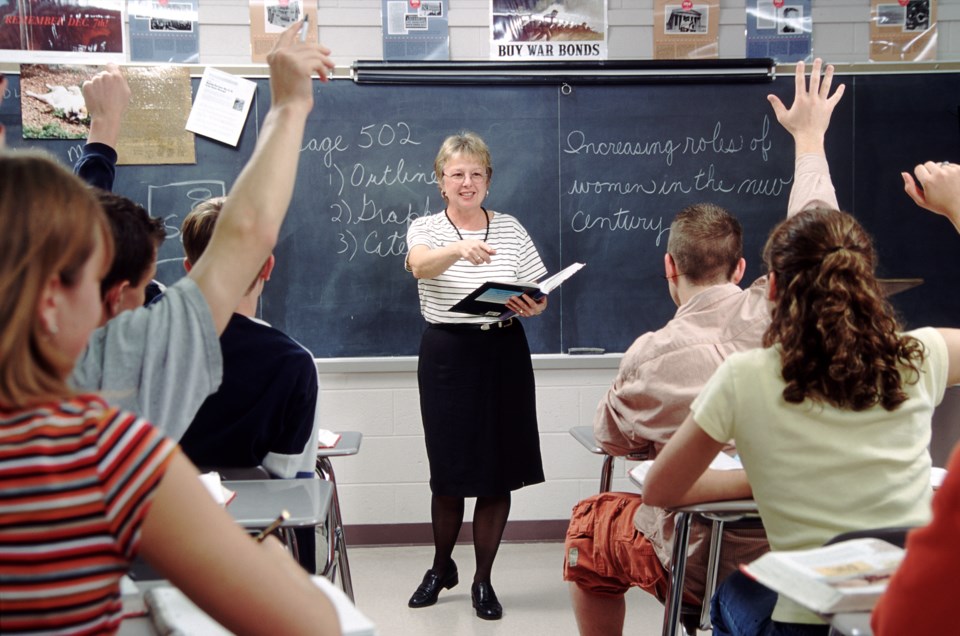One-third of North American students believe that the Holocaust was exaggerated or fabricated, according to a new study from Liberation75.
The study was conducted by Dr. Alexis Lerner, Presidential Data Postdoctoral Fellow at Western University, on behalf of Liberation75. The survey included American classrooms, but most respondents came from Canadian schools, Grades 6 to 12.
Students answered the questionnaire before receiving Liberation75’s education treatment and then again after to assess knowledge about the Holocaust and the impacts of Holocaust denial.
And while one-third of students questioned whether the Holocaust happened before the education treatment, the number didn’t drastically decrease after it: 23 per cent of students still questioned whether the genocide was exaggerated.
As a result of the study’s results, Liberation75 is calling on provincial and territorial governments in Canada to mandate robust Holocaust education.
Ezra Shanken, the CEO of the Jewish Federation of Greater Vancouver, also echoed this recommendation in a statement to Glacier Media.
“Studies like this only highlight the importance of Holocaust education. Genocide education and the Holocaust should be part of the core curriculum taught in schools.”
According to the study, no Canadian province or territory mandates Holocaust education as part of the secondary school curricula.
But the B.C. Ministry of Education refuted this claim.
In a statement to Glacier Media, the ministry said in “Social Studies 10, students learn about discriminatory policies and injustices in the world, including the Holocaust.”
Besides a non-mandatory genocide education course called Genocide Studies 12, the ministry stated that “the Holocaust and two world wars are topics with direct connections throughout the curriculum.”
For Nina Krieger, executive director of Vancouver Holocaust Education Centre, the results are alarming and an opportunity for change.
“At a time when we are losing the last eyewitnesses of Nazi crimes, we are encountering an increasing misuse of Holocaust history, exacerbated by the global pandemic. The study points to a lack of knowledge, and social media being a key source of young people’s understandings of the most well-documented genocide in history.”
‘Never Forget’
Over the weekend, as the trucker convoy rally that began in B.C. headed to Parliament Hill in protest of vaccine mandates and other restrictions, many trucks and vehicles across Canada drove around in their local cities to show solidarity.
In Vancouver, honking trucks and cars drove around the downtown area, with crowds of people lining the streets with signs calling for “freedom.” Many drivers and people on the streets also waved their Canadian flags.
But in Ottawa, some protesters used Nazi imagery and the Confederate flag in addition to defaming the city’s Terry Fox statue.
In a press release, CEO of the Jewish Federation of Ottawa Andrea Freedman stated that all Canadians must reject and condemn these symbols of hatred.
“The pernicious nature of antisemitism is that it morphs and becomes a convenient hook for all manner of grievance, real or imagined.”
While the convoy claimed to oppose all COVID-19 restrictions, experts say the organizers are involved in the far-right movement.
Evan Balgord, executive director of the Canadian Anti-Hate Network, told Global News that the organizers have previously been involved in far-right movements and have made Islamophobic comments in the past.
Whether the date of the convoy in Ottawa and similar rallies across Canada was intentionally chosen, it aligned with the 5th anniversary of the mosque shooting in Quebec that murdered six people and injured 19.
Strong media literacy
The Liberation75 study also revealed that 40 per cent of students who had some knowledge about the Holocaust encountered it on social media.
On TikTok, there are over 200 million videos under the hashtag #holocaust. Some videos are educational, but many lack verified facts. The app presents a disclaimer when searching the hashtag, which encourages users to verify the information they see with trusted sources.
Social media can be a great place to learn, but it can also be a space with a plethora of unverified information.
“A lot of the disinformation that is on social media tends to be stuff that is sort of meme or make a joke out of things. It can appear to be based in historical knowledge but really isn’t,” said Dr. Carmen Celestini of The Disinformation Project at SFU’s School of Communication.
“And when that isn’t reinforced with education programs or even engaging with somebody who can provide an emotional outlet and understanding of historical event or current event, there seems to be a disconnect.”
Although Liberation75’s recommendation based on their report is to improve the public school curriculum in Canada, Dr. Celestini emphasizes teaching media literacy is an integral part of ensuring young people have the skills to filter out the truth and fabrications.
“People have to engage with their children and talk about historical events, what they’re taught, and what they’re seeing on social media. The onus is on schools to teach things about history, how to understand fake news, and what disinformation is, and how to differentiate that, as well as fact checking.”



